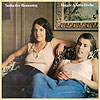Maggie and Terre Roche, Seductive Reasoning (Reissue)
Published on February 21st, 2012 in: Current Faves, Feminism, Music, Music Reviews, Reviews |By Chelsea Spear

One could pinpoint 1975 as one of the first years of “The Woman in Rock.” Patti Smith’s Horses had just hit the racks; Heart released their first single and began recording their debut album; and The Runaways and Blondie had just formed. All these artists and bands created fierce and highly idiosyncratic rock, and their various images—tough, cathartic, slightly cartoonish—would inspire many girls to start making music.
Amidst this cacophony of strong personalities, Maggie and Terre Roche saw their debut album, Seductive Reasoning, receive a quiet release. Their songs hearkened back to the heart-on-sleeve confessionals of post-Dylan coffeehouse folk, and their melodies and vocal arrangements took their inspiration from doo-wop. Their image hewed closer to that of Lisa Loopner than to the Lady Rimbaud or Leather Tuscadero-esque archetypes their peers would embody. While their album made few headlines and quickly hit the cutout bins, Maggie and Terre’s pleasing folk-pop and feminist perspective helped forge another path for girls who might not be ready for the confrontational point of view espoused by their peers.
Mentioning Seductive Reasoning in the same breath as Horses or Dreamboat Annie might at first seem like an unfair comparison. Maggie and Terre sang in sweet voices and harmonized like the Andrews Sisters, and the music behind them shifted from sweeping strings to Muscle Shoals funk. On a purely melodic and production level, these songs could have been dropped into a playlist in the ’50s or early ’60s. A closer listen, though, reveals a surprising feminist lyrical streak.
In this set of songs, the Roche sisters depicted the life of a ramblin’ girl. Many of the songs take place in the kinds of dangerous situations one finds on the open road. Few lady singers would pull off a comedy of errors about pickpocketing like “If You Empty Out All Your Pockets.” The casual depiction of hitchhiking and interracial romance in “Down the Dream” likewise carries a subversive sheen when put against a hummable melody and sung in a dry, vibrato-free soprano. Likewise, the sisters wryly observe the double standards between the sexual experience of men and women in a lighthearted manner in the opening song, “Underneath the Moon,” and look at it more seriously in “Jill of All Trades,” the poignant ballad that closes the album. Even in its smallest details—like a throwaway reference to the Pill in “Telephone Bill”—Maggie and Terre espouse an accessible vision of feminism that’s about creativity and personal autonomy.
The vocal delivery of the sisters also suggests their influence on later generations. The sweeping string section on “West Virginia,” coupled with Terre’s empathetic portrayal of a socially awkward egghead, seems like the blueprint for Tori Amos’s “Pretty Good Year.” Likewise, Maggie’s declamatory vocals on “Pockets” suggests Kristin Hersh’s solo material.
Not all of Seductive Reasoning works. The staccato “Wigglin’ Man” shows the sisters’ over-quirky side, which would come to greater fruition on their albums as a vocal trio (with sister Suzzy). Though “Telephone Bill” and “The Mountain People” both build into credible songs, the half-assed-sounding wordplay might initially put listeners off.
“Jill of All Trades” ends with the line “All o’ you will buy a ticket just to see my face again.” While the Roches never broke through to the iconic highs of Patti or Joan, this album proved an auspicious debut for the sisters. In 2012, the album is both bracing and poignant, and completely timeless.
Seductive Reasoning was originally released in 1975; this reissue was released on January 24 through Real Gone Music and can be ordered directly from their website.
Time limit is exhausted. Please reload the CAPTCHA.